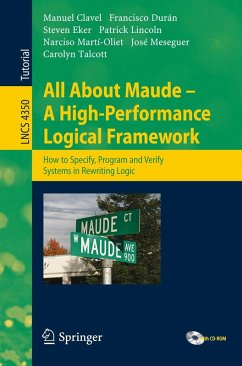Maude is a language and system based on rewriting logic. In this comprehensive account, you'll discover how Maude and its formal tool environment can be used in three mutually reinforcing ways: as a declarative programming language, as an executable formal specification language, and as a formal verification system. Examples used throughout the book illustrate key concepts, features, and the many practical uses of Maude.
Dieser Download kann aus rechtlichen Gründen nur mit Rechnungsadresse in A, B, BG, CY, CZ, D, DK, EW, E, FIN, F, GR, HR, H, IRL, I, LT, L, LR, M, NL, PL, P, R, S, SLO, SK ausgeliefert werden.
From the reviews:
"This book is designed as a comprehensive introduction and reference to Maude as a system. ... Whether you are a researcher in formal methods or only curious about different programming paradigms, this reference work is an interesting read. This very hands-on book is full of illuminating examples. ... This book is an ideal introduction for computer professionals interested in more formal programming paradigms." (Markus Wolf, ACM Computing Reviews, Vol. 49 (12), December, 2008)
"This book is designed as a comprehensive introduction and reference to Maude as a system. ... Whether you are a researcher in formal methods or only curious about different programming paradigms, this reference work is an interesting read. This very hands-on book is full of illuminating examples. ... This book is an ideal introduction for computer professionals interested in more formal programming paradigms." (Markus Wolf, ACM Computing Reviews, Vol. 49 (12), December, 2008)

